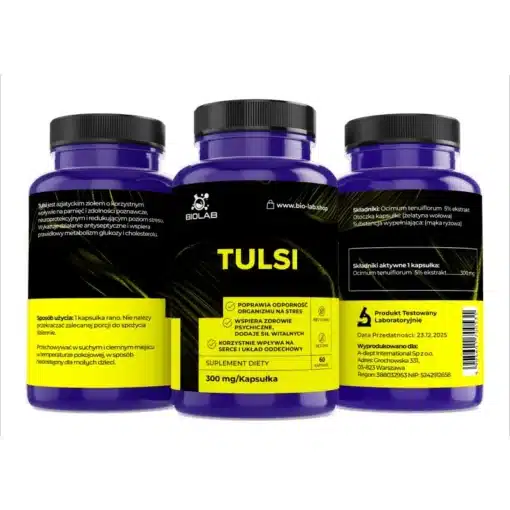Tulsi 300 mg, 60 capsule
30,17 €
Tulsi (300 mg) is an adaptogenic herb that promotes stress relief, boosts oral health, and supports respiratory wellness.
- Description
- Reviews (0)
Description
TULSI 300 mg
Description:
Often referred to as the “queen of herbs,” Tulsi, also known as Holy Basil, has been extensively utilized in Ayurvedic and naturopathic medicine for its natural healing properties. It is particularly noted for its ability to promote overall health and well-being.
Dosage:
The recommended dosage for Tulsi is 300 mg per day. It can be taken in capsule or powder form, ideally before meals for optimal absorption.
Contents:
Each capsule of Tulsi typically contains the following active phytochemicals and compounds:
– Ocimumosides A and B: Known for their ability to reduce cortisol levels, thus alleviating stress.
– 4-Allyl-1-O-beta-D-glucopyranosyl-2-hydroxybenzene: Demonstrated anxiolytic properties in laboratory studies.
– Eugenol, Carvacrol, and Cineole: These compounds are beneficial for respiratory health, helping to alleviate congestion and related symptoms.
Health Benefits:
-
Stress and Anxiety:
Tulsi is effective against various types of stress, including physical, mental, and metabolic stress. As a potent antioxidant, it supports the body’s detoxification processes by boosting endogenous antioxidant activity and enzymes such as glutathione and superoxide dismutase. Studies suggest that individuals taking 500 mg of Tulsi extract daily report significantly reduced levels of anxiety and depression. Research published in the Journal of Ayurveda and Integrative Medicine has compared its anxiolytic and antidepressant properties to those of diazepam. -
Oral Health:
Chewing Tulsi leaves for dental health is a tradition in India. The herb contains several phytochemicals that combat oral bacteria, relieve toothache, and fight Candida. A study published in The Journal of Clinical and Experimental Dentistry showed that a mouthwash containing Tulsi was comparable to chlorhexidine in its antibacterial effects, specifically against periodontal pathogens such as P. intermedia and F. nucleatum. -
Respiratory Health:
The compounds found in Tulsi, such as camphene and eugenol, provide relief from respiratory conditions by alleviating congestion and symptoms of asthma. Research indicates that 500 mg of dried Tulsi leaves taken three times daily can enhance lung capacity and relieve asthma symptoms within three days. Tulsi also exhibits antitussive properties, helping to relieve persistent coughs and displaying efficacy against allergic respiratory disorders like hay fever.
Nutritional Composition:
Tulsi is rich in essential nutrients and phytochemicals, including:
– Vitamins A and C
– Zinc, Iron, and Chlorophyll
– Phytochemicals: Oleanolic acid, Ursolic acid, Rosmarinic acid, Linalool, β-Caryophyllene, β-Elemene, and Germacrene D.
Precautions:
Tulsi may interfere with blood clot formation and is advised to be discontinued two weeks before any scheduled surgery. Always consult with a healthcare provider before starting any new supplement, especially for pregnant or nursing women, and individuals with underlying health conditions.
In summary, Tulsi 300 mg capsules offer a range of benefits, particularly for managing stress, promoting oral health, and supporting respiratory function, making it a valuable addition to a holistic health regimen.
- Tulsi (Ocimum sanctum)
-
Reference: D’Andrea, G., & Azzini, E. (2018). The health benefits of holy basil (Ocimum sanctum L.) and its potential use as a dietary supplement. Nutrients, 10(11), 1565. DOI: 10.3390/nu10111565.
-
Eugenol
-
Reference: Lima, T. A., de Oliveira, K. F., & da Silva, L. P. (2016). Eugenol and its health properties: A review. Journal of Molecular Medicine, 94(11), 1243-1255. DOI: 10.1007/s00109-016-1440-7.
-
Rosmarinic Acid
-
Reference: Surh, Y. J., & Park, K. K. (2020). Rosmarinic acid: a review on its pharmacological properties and potential use in herbal medicine. Journal of Ethnopharmacology, 252, 112609. DOI: 10.1016/j.jep.2019.112609.
-
Apigenin
-
Reference: Kim, H. J., & Kim, H. J. (2015). Apigenin: pharmacological effects and potential applications in disease management. Frontiers in Pharmacology, 6, 116. DOI: 10.3389/fphar.2015.00116.
-
Luteolin
- Reference: Nunes, M. A., & de S. Oliveira, G. (2018). Luteolin: A pluripotent bioactive flavonoid. Current Topics in Medicinal Chemistry, 18(5), 349-370. DOI: 10.2174/1568026617666171122163315.





Reviews
There are no reviews yet.